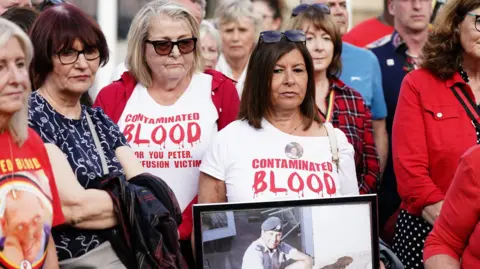In a pivotal announcement, the UK government has committed to implementing “substantial changes” to the compensation scheme linked to the notorious infected blood scandal, a decision that has been met with cautious optimism from victims’ groups. This revelation was made publicly by Cabinet Office minister Nick Thomas-Symonds in Parliament just two weeks after a scathing assessment of the existing payment scheme was released as part of a public inquiry into the debacle. The inquiry highlighted not only the horrendous repercussions of the contaminated blood products administered during the 1970s, 80s, and early 90s but also the deficiencies in the allied governmental response to this humanitarian catastrophe.
During the late 20th century, it is estimated that approximately 30,000 individuals were infected with HIV, hepatitis B, or hepatitis C as a consequence of receiving contaminated blood products from the National Health Service (NHS). The government acknowledges the immense suffering endured by these individuals and the families of those impacted. This acknowledgment is key to rebuilding trust, as even Minister Thomas-Symonds stated, “Our focus as we move forward must be working together to not only deliver justice to all those impacted but also to restore trust in the state to people who have been let down too many times.”
Victims’ groups have expressed a mix of appreciation and frustration regarding the government’s announcement. While they cautiously welcomed the proposed changes, many were disheartened to learn that a portion of the adjustments would require further consultation, delaying implementation. Prior to this, the inquiry’s chair, Sir Brian Langstaff, had issued a robust critical report that asserted the need for thorough reform, emphasizing the alarming manner in which affected individuals had been treated and how compensation payouts had been inadequately managed.
The government’s new direction comes in response to the inquiry’s recommendations. Seven out of sixteen suggestions have been accepted as immediate reforms to improve the compensation framework. The operational body assigned to manage these payments, known as the Infected Blood Compensation Authority (IBCA), has also accepted the need for numerous adjustments, committing itself to all eleven recommendations that fall under its jurisdiction.
Notable changes include the establishment of a new system that allows applicants to proactively register for compensation without having to await an invitation. Furthermore, support payments for widows of deceased victims will be resumed until their claims are finalized. This extends to newly eligible individuals infected with HIV before a cutoff date in 1982, who were previously denied claims. Additionally, the government is keen on reviewing supplementary payments for those who were subject to unethical medical experimentation linked to the scandal.
The inquiry’s recent findings have underscored that many victims faced further harm from how their claims were handled, leading to an urgent need for reform. Thomas-Symonds affirmed that reforms would likely incur additional costs—expected to exceed the already substantial £11.8 billion earmarked for compensation throughout Parliament’s tenure. Greater transparency was promised, with updates on predictions regarding total expenditure expected to be made in the forthcoming autumn budget.
Moreover, family members who had passed away before completing their claims are now assured that their entitlements can be inherited through their estates, which is a significant shift in policy. This change aims to acknowledge the continuing impact of the scandal on families and provide them with a further layer of financial security.
Andy Evans, the chairman of the advocacy group Tainted Blood, which represents over 1,600 victims and their kin, commented on the government’s latest moves with tempered hope. He stated that while the government is making strides to address their concerns, further work is needed, particularly regarding compensation levels for hepatitis victims.
The outlook on this compensation scheme reflects a society grappling with the shadows of past negligence and a government endeavoring to reconcile with its citizens in an attempt to rectify historic wrongs. The commitment to reform and ongoing consultation promises a path forward, albeit one fraught with complexity and a legacy of tragedy that can never be fully remedied. The response to these changes remains pivotal in restoring faith among the victims and communities affected by the grievous errors of the past.











